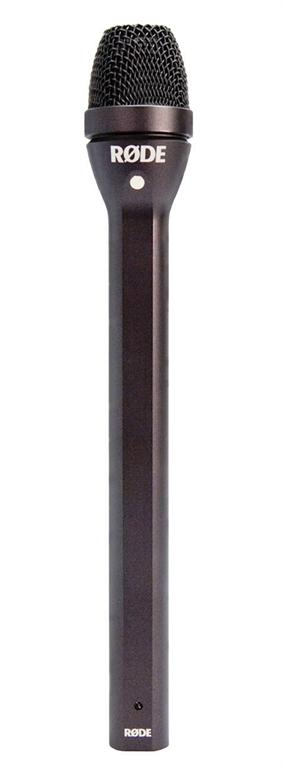Røde’s Reporter Microphone
My first mental image of a dynamic omni stick mic is that of NBC’s Al Roker trying to remain vertical for a live standup during a hurricane. We always hear him just fine, even in 60 mile per hour winds. I believe that it’s been some time since anyone has taken a shot at this category of microphone, so it’s interesting to see how well the new Røde Reporter stacks up.

The Rode Reporter onmidirectional microphoneFEATURES
The Røde Reporter is a classic handheld, end-address, dynamic omni stick mic in a long-handled form factor. It comes in a designer box with zipper pouch and mic clip. The mic’s 10.7-inch shaft is three inches longer than the industry-standard ElectroVoice RE50, providing a few more inches of reach for inquisitive video journalists. A two-sided clip-on flag holder is provided for station logos. Unlike square flag holders, this requires the user to make sure that the mic is held with the flag broadside instead of on edge to the camera so the flag is visible.
That’s where the Reporter’s unique shaft shape comes in handy. The mic is flattened on one side. While the on-camera talent is trying to make their point to the camera, all they have to do is hold the shaft so that their thumb is on the flat side and make sure the flag is turned so that it faces the camera.
The body is made of a hardy die-cast aluminum alloy coated in a matte black non reflective finish. The headgrille is comprised of three layers of metal mesh, also non reflective. The innermost screen is almost half an inch below the outer two, providing a nice space for plosives to slow down before encountering the final screen. As the headgrille is easily removed by simply unscrewing it, you can dunk the grille in disinfectant periodically during flu season to prevent contagion.
The capsule itself has a final thin foam screen set into the handsome brass housing. The capsule is difficult to remove.
The spec sheet quotes a 150 Ohm impedance, a 70 Hz to 15 kHz frequency response, and sensitivity at −56.0 dB, referenced to 1 Volt/Pascal (1.00 mv @ 94 dB SPL) ±2 dB @ 1 kHz.
The Reporter weighs in at just slightly more than half a pound.
On the upper end, the frequency response of the Røde Reporter has a lift that begins to rise at 3 kHz and hits + 5dB at 6 kHz. This will pull the voice nicely out of the mud. The response stays there until 11 kHz when it starts dropping down across 0 dB at about 15 kHz. The low end is fl at to about 120 Hz, and then slopes off to −10 dB at 40 Hz. That will push the mud a bit farther down without taking the bottom off most voices.
IN USE
I didn’t have those hurricane force winds available for testing, but I did spend some time actively trying to “pop” an EV RE50 N/D and the Reporter. When you blow directly into either mic, it’s obvious that you are no longer talking, but apart from that, they both survived equally well.
I also manhandled each microphone to generate handling noise. The RE50 N/D was slightly less susceptible; or rather the frequency of what it heard was lower than that heard by the Reporter. Not a big difference, and with gloves on, both mics quieted down.
SUMMARY
Well-made onmidirectional microphones are supposed to sound pretty even, with no on- or offaxis frequency lobes. I spent some time moving around the capsule in search of beams, peaks and nulls but found no axial anomalies. The Røde Reporter is a lightweight, but solid piece of gear. To back that up, it comes with a 12 month warranty that extends to a 10 year warranty when you register after logging onto www.rodemic.com.
Ty Ford has been review professional audio gear for over 20 years. Find out more about him atwww.tyford.com.
FAST FACTS
APPLICATION
ENG/EFP audio pickup
KEY FEATURES
Sturdy construction, light weight, well priced
PRICE
MSRP $299
CONTACT
Rode Microphones
805-566-7777
www.rodemic.com
Get the TV Tech Newsletter
The professional video industry's #1 source for news, trends and product and tech information. Sign up below.
